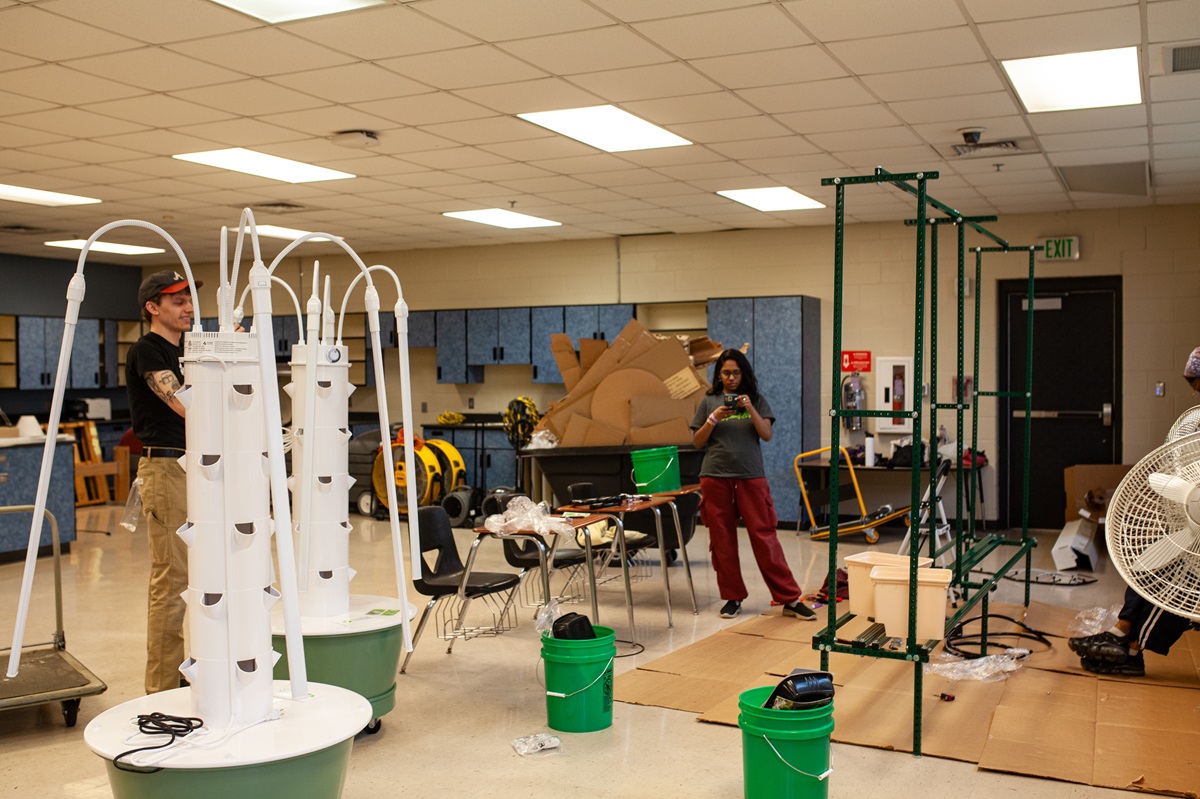UAB Callahan Eye Foundation is ‘Worth Gold’ to Alabamians

Russ Hatfield doesn’t hesitate when asked about his most valuable possession: his eyesight. The Trussville resident, who noticed his vision was quickly slipping away, said this was a hard-learned realization. Hatfield said he owes his enormously improved vision to Dr. Mike Callahan, a longtime Birmingham ophthalmologist who practices at UAB Callahan Eye Foundation at Birmingham.
“Within a three-month period in 2011, my eyes deteriorated to a point where the signs on the roadside looked blurred,” said Hatfield, a project manager for Yates Construction in Birmingham.
Callahan Foundation from Alabama NewsCenter on Vimeo.
Callahan performed an eye exam on Hatfield and recommended surgery due to cataracts. He replaced the cornea of Hatfield’s left eye, which required immediate attention. The results far exceeded Hatfield’s expectations.
“I was at UAB Callahan Eye Hospital at 6 a.m. and back home by 1 p.m. when I had my operation,” Hatfield said. “Before, I could hardly see the larger cones on a pine tree just outside on our deck.”
He experienced amazing results the day after surgery. “I was dancing on the floor,” Hatfield said. “I was beside myself almost, at how well I could see.” Surgery on his right eye went equally as well. A few years later, Hatfield had sight-saving retinal reattachment surgery at UAB Callahan Eye Foundation, which prevented him from going blind in his right eye.
“Dr. Callahan is my hero,” Hatfield said. “This UAB Callahan Eye Hospital is worth gold. I don’t think people realize all that we’ve got here.”
World-class eye care in Birmingham
Even with today’s great medical advances, says Mike Callahan, whose father founded Alabama’s renowned UAB Callahan Eye Hospital, age-related vision loss and complications are a phenomenon almost everyone faces. The good news is that, with the help of the facility’s 80 eye specialists, Alabamians and residents throughout the Southeast have access to world-class vision care.
As part of the prestigious UAB Hospital system and one of only two Level 1 ocular trauma centers in the nation, UAB Callahan Eye Hospital is a jewel in UAB Hospital’s inimitable crown. It is the second-busiest retinal-treatment center in the U.S. The hospital not only features the Southeast’s only 24/7 eye emergency department, it also has nine dedicated operating rooms – with eight more ORs to be built in the next year-and-a-half – to support more than 11,000 eye surgeries annually.
For 50 years, UAB Callahan Eye Hospital has focused on delivering innovative eye care and pioneering breakthroughs to preserve and restore eyesight, said Brian Spraberry, CEO of UAB Callahan Eye Hospital.
“We have been recognized internationally and nationally for outstanding patient care, treatment of eye trauma and crucial research in eye disease,” Spraberry said.
“We are the only eye specialty hospital serving the residents of Alabama, and one of the few facilities in the world entirely dedicated to advancement in ophthalmology. Our collaboration with the UAB Department of Ophthalmology promotes a robust research effort and provides the only accredited ophthalmology training program in Alabama.”
The eye hospital sees 23,000 patients annually, some hailing from as far away as England, France and Saudi Arabia.
New, sight-saving retinal surgeries prevent blindness UAB Callahan Eye Hospital is home to some of the world’s top retina specialists, ophthalmologists who treat retinal diseases and injuries that just 20 years ago caused blindness in many people.
Dr. Richard Feist, who graduated from UAB Medical School and performed two surgical residencies in Iowa, desired to return to Alabama to work at UAB Callahan Eye Hospital. For nearly 22 years, Feist has worked with the Retina Specialists of Alabama on the hospital’s seventh floor.
“This is a very rewarding field,” said Feist, who has received two Honor Awards through the American Academy of Ophthalmology. He treats patients with age-related macular degeneration, which affects the central vision of the eye, illnesses such as cataracts and diabetic retinopathy, and performs eye laser surgery to repair retinal holes and tears, as well as retinal reattachment surgery.
“We have improved a lot in helping prevent the issues and illnesses that damage the retina,” he said, “but we still don’t have a way to repair retina that is lost to disease. We’re good at salvaging, but are not good at renovating, yet.”
Retina Specialists of Alabama screens more than 1,000 patients a year for retinal problems, Feist said. Of that number, about 10 percent of patients have retinal tears or a retinal detachment, which are unusual occurrences, he said. Most retinal detachments occur in middle-aged patients.
“With retinal detachment, the success rate is over 90 percent for one surgery, and with two surgeries, the success rate is over 95 percent,” Feist said.
Encouraging patients to protect eyes, overall health
It was natural for Mike Callahan to grow his ophthalmology practice at UAB Callahan Eye Hospital, founded in 1964 by his father, the well-known Birmingham ophthalmologist Dr. Alston Callahan.
A renowned eye specialist in his own right, Mike Callahan graduated from UAB Medical School. He provides specialty and routine eye care for patients of every age, performing more than 600 surgeries annually for the removal of cataracts, specializing in no-stitch cataract surgery. He also performs plastic reconstructive and cosmetic procedures, as well as general eye exams.
Many of Callahan’s patients have followed him since he founded Callahan and Associates.
Hospital’s remarkable beginning
Growing up, Mike Callahan often heard his father talk about UAB Callahan Eye Hospital’s fateful beginning, which started in the 1950s with a 5-year-old girl. Alston Callahan treated young Barbara Ingalls’ crossed eyes with a combination of glasses and eye-strengthening exercises.
Her grandfather Robert Ingalls was a wealthy industrialist and founder of Ingalls Ironworks and Ingalls Shipbuilding Corp. Upon learning that Callahan hadn’t charged the family for his granddaughter’s eye treatments, Ingalls demanded he do so. Instead, Callahan asked Ingalls to give to help establish an eye specialty hospital in Birmingham. It had long been Callahan’s desire to open a facility to provide the best possible eye care to everyone who needed it, regardless of ability to pay.
“He knew he could make an impact,” Callahan said. “He wanted to help the people of Birmingham.”
Ingalls agreed to donate $10,000 for a medical eye facility only if Callahan could raise the amount within a week from other Birmingham business leaders. After a week of making the rounds among his friends and calling on many business owners, Callahan had amassed only $7,500. He was dismayed that he would be forced to tell Ingalls he hadn’t been able to raise the money.
“It was a Saturday morning,” Mike Callahan said, “and Dad was looking at the mail. He opened an envelope and found a check for $2,500 from a patient in Columbus, Georgia. He’d performed cataract surgery and had charged only $500. But the man wrote Dad that his sight was worth so much more than what he had paid. So Dad had the $10,000 he needed for Ingalls’ donation.”
It was, in Mike Callahan’s estimation, a “God moment.” The elder Callahan visited Ingalls the same day. Ingalls could barely believe that Callahan had raised the required $10,000 – but, true to his word, he provided the promised donation.
In that moment in 1963, the Eye Foundation Hospital was born – a partnership between businesspeople, ophthalmologists and attorneys. Joining the UAB Health System in 1997, the Callahan name was added to the hospital’s title in 1999 to honor the visionary who had made it possible.
Mike Callahan is proud to practice at UAB Callahan Eye Hospital and continue in the legacy of his father, who astutely gauged the need for a specialized eye hospital in Birmingham.
“UAB Callahan Eye Hospital’s dedication to preserving and restoring sight remains strong,” he said. “The hospital is renowned for its advances in eye care, breaking through old ways of treating blinding eye diseases and revolutionizing many areas of ophthalmology. Even more exciting days are to come.”
‘Care for your eyes, and they’ll care for you’
Alabamians and residents throughout the Southeast are “blessed and fortunate” to have access to world-class eye care provided through the UAB Callahan Eye Foundation in Birmingham, said Russell Hatfield, a longtime patient of ophthalmologist Dr. Mike Callahan. Here, Callahan and retinal specialist Dr. Richard Frist offer top tips for caring for your eyes.
- Cakes, cookies and sugar are the enemy. “It’s important to watch your diet and your exercise, and to rest,” Callahan said. Every aspect of one’s diet and lifestyle affect both eyesight and overall health.
- It’s necessary to get full eye examinations at age 50. “With glaucoma, there are no symptoms, at first,” Callahan said. “It’s a disease that causes eye pressure to be too high, and it damages the peripheral vision – it’s like seeing through a pencil point. When the last bit goes, it’s gone forever.
- Take the time to buy a pair of safety eye glasses before starting spring yard work. Mowers and weed eaters – which throw debris into your path as you work – are detrimental, Callahan said.
- For patients diagnosed with macular degeneration, Callahan advises taking lutein and zeaxanthin. In the Eye Disease Case Control Study, in which diet was compared to the risk for developing macular degeneration, results showed a significantly lower risk for developing the eye disease in people with high amounts of those vitamins in their blood.
- Stay active and keep your weight down to prevent diabetes and to keep blood pressure at normal levels. Overweight patients have a higher risk of macular degeneration and other circulatory related eye diseases, Feist said.
- Don’t smoke. The habit is extremely damaging to the eyes, and can cause inflammation in the walls of the blood vessels and age-related macular degeneration, Feist said.
- If you spot new “floaters” – black spots that appear in one’s vision – or flashing lights or a blind area in the visual field, see an eye specialist. These are the first indicators of a possibly serious retinal problem. “The retina is one part of the body that we can’t examine on our own,” Feist noted. “The one thing we can do is screen for injury to the retina, in which case many retinal tears and holes can be lasered before they lead to a full-blown retinal detachment.”
For more information about vision care, visit this site.





